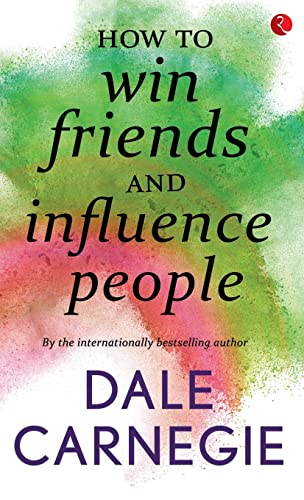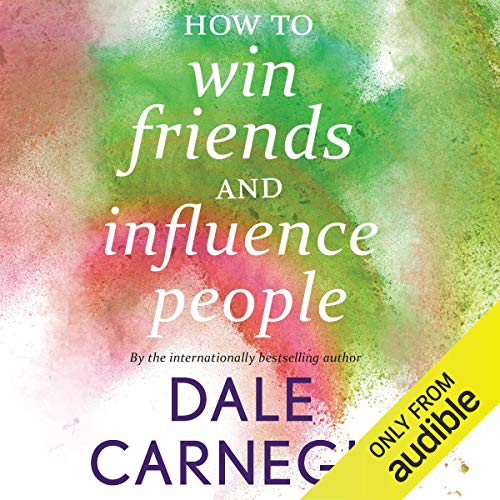Table of Contents

Dale Carnegie’s 1936 publication “How to Win Friends and Influence People” is a timeless self-help classic. This book also Holds Names in “THE GUARDIAN“, “LITHUB“, “The Book report Network” and “BookReporter” as having the highest sales Records offline and Online.
It continues to be one of the best-selling books of all time and has received much acclaim for its useful guidance on forming connections and having a good influence on others.
How to Win Friends and Influence People- Main Principles & conclusions
Value of Understanding
Carnegie highlights the value of understanding others’ viewpoints and demonstrating genuine interest in their needs and feelings while discussing the relevance of empathy.
Strong connections and genuine relationships are fostered by empathy.
The power of listening
Making friends and influencing others requires the ability to listen carefully to others.
According to Carnegie, active listening is paying close attention to the speaker and demonstrating a sincere interest in what they have to say.
Never Underestimate the Power of Listening
Avoid criticizing and blaming people
since these actions seldom have a good impact. Carnegie recommends readers to put more emphasis on admiration and laudation.
One might foster a more upbeat and encouraging environment by promoting people’s talents and successes.

Be truly interested in others
People cherish and appreciate being valued. Carnegie contends that developing a genuine interest in the lives and experiences of people may result in closer relationships and better rapport.
Influence via collaboration
The book advocates the notion of coming to an understanding with people and working together to accomplish shared objectives.
Collaboration and collaboration can result in stronger influence and enduring connections.
The significance of having a positive outlook
Your ability to remain upbeat and cheerful can greatly influence how other people see you.
Carnegie advises readers to avoid concentrating on the negative features of circumstances and to concentrate on their good qualities.
TO BUY THIS BOOK & GET DETAILED DEPTH OF THE SUBJECT
Managing disputes gracefully
Carnegie counsels readers to steer clear of fights and instead look for common ground when confronted with conflicts or differences.
Better outcomes and deeper relationships may result from the respectful and understanding resolution of conflicts.
Appeal to people’s interests
In order to effectively influence others, it is important to comprehend their motives and interests.
The chance of a favorable reaction can be increased by matching your strategy with what matters most to them.
Use tales to communicate ideas
Carnegie stresses the importance of using stories in communicating.
Anecdotes and anecdotes can be more interesting and memorable than plain facts, which makes them a powerful persuasion tool.
Expressing Ideas & Experiences
People often like talking about themselves and their experiences, so encourage others to do the same.
You may strengthen your relationships with people by empowering them to express their ideas and experiences.
Overall, “How to Win Friends and Influence People” offers useful advice for creating deep connections and having a positive influence on others.
Its tenets have been extensively adopted by readers of all generations and are useful in both personal and professional situations.
How to Win Friends and Influence People – Book Review
“How to win friends and Influence People” is a self-assist book written by Dale Carnegie, and first posted in 1936.
It is broadly taken into consideration as one of the quality-selling books of all time and stays enormously influential within the fields of private improvement, communique, and interpersonal relationships.
On average, the book’s standards revolve around empathy, active listening, true hobbies in others, and finding the common floor.
At the same time as some critics argue that the book’s advice can be overly simplistic and manipulative if misused, its core thoughts are commonly taken into consideration for constructing higher relationships, enhancing conversation skills, and turning into an extra influential and effective individual.
It is crucial to be aware that the book has been written in a unique generation, and some of its language and examples might feel previous or no longer relevant in all contexts these days.
But, among the underlying concepts are undying and might nonetheless be useful if tailored to modern-day social norms and communication patterns.
In conclusion, this book is a conventional self-improvement book that offers practical recommendations for enhancing social competencies, verbal exchange, and interpersonal relationships.
Its enduring recognition attests to the cost it keeps delivering to readers searching to beautify their interactions and impact in a tremendous manner.
How to Win Friends and Influence People – Dale Carnegie Quotes
“How to Win Friends and Influence People” is filled with insightful quotes that offer valuable lessons on communication, relationships, and personal growth. Here are the most notable quotes from the book:
- “It isn’t what you have or who you are or where you are or what you are doing that makes you happy or unhappy. It is what you think about it.”
- “The only way I can get you to do anything is by giving you what you want.”
- “You can’t teach an old dogma new tricks.”
- “Actions speak louder than words, and a smile says, ‘I like you. You make me happy. I am glad to see you.'”
- “Remember that a man’s name is to him the sweetest and most important sound in the English language.”
- “The unvarnished truth is that almost all the people you meet feel themselves superior to you in some way, and a sure way to their hearts is to let them realize in some subtle way that you recognize their importance, and recognize it sincerely.”
- “The chronic kicker, even the most violent critic, will frequently soften and be subdued in the presence of a patient, sympathetic listener— a listener who will be silent while the irate fault-finder dilates like a king cobra and spews the poison out of his system.”
- “I have come to the conclusion that there is only one way under high heaven to get the best of an argument—and that is to avoid it.”
- “When we hate our enemies, we are giving them power over us: power over our sleep, our appetites, our blood pressure, our health, and our happiness.”
- “Be wiser than other people if you can; but do not tell them so.”
- “If there is any one secret of success, it lies in the ability to get the other person’s point of view and see things from that person’s angle as well as from your own.”
- “The world is full of people who are grabbing and self-seeking. So the rare individual who unselfishly tries to serve others has an enormous advantage. He has little competition.”
- “Criticism is dangerous, because it wounds a person’s precious pride, hurts his sense of importance, and arouses resentment.”
- “You can’t win an argument. You can’t because if you lose it, you lose it; and if you win it, you lose it.”
- “People who can put themselves in the place of other people, who can understand the workings of their minds, need never worry about what the future has in store for them.”
- You can make more friends in two months by becoming interested in other people than you can in two years by trying to get other people interested in you.”
- “Don’t be afraid of enemies who attack you. Be afraid of the friends who flatter you.”
- “The only way on earth to influence other people is to talk about what they want and show them how to get it.”
- “If there is any one secret of success, it lies in the ability to get the other person’s point of view and see things from that person’s angle as well as from your own.”
- “Remember that a person’s name is to that person the sweetest sound in any language.”
- “The royal road to a man’s heart is to talk to him about the things he treasures most.”
- “You can’t win an argument. You can’t because if you lose it, you lose it; and if you win it, you lose it.”
- “Criticism is futile because it puts a person on the defensive and usually makes them strive to justify themselves.”
- “The expression one wears on one’s face is far more important than the clothes one wears on one’s back.”
- “Arouse in the other person an eager want. He who can do this has the whole world with him. He who cannot walks a lonely way.”
- “Any fool can criticize, condemn, and complain, and most fools do.”
- “Talk to someone about themselves and they’ll listen for hours.”
- “The way to get things done is to stimulate competition. I do not mean in a sordid, money-getting way, but in the desire to excel.”
- “When dealing with people, let us remember we are not dealing with creatures of logic. We are dealing with creatures of emotion, creatures bristling with prejudices and motivated by pride and vanity.”
- “You can measure the size of a person by what makes him or her angry.”
Other Related Topics
- Sales Presentation
- Sales Forecasting
- Sales Quota
- Sales Management
- Sales Territories
- Salesman – Types & Functions
- Buying Motives – Types & Stages
- Market Research
- What is Salesmanship? – Full Concept
- To Sell Is Human: Review & Summary – Quick Read
- The Psychology of Selling – Quick Read
- Book Insights & Review: “How to Win Friends and Influence People”
- World Most Selling Salesmanship Books| You Must Buy
- The Most Essential Knowledge for a Salesman
- Personal Selling: Full Concept In Detail
- The Essential Qualities & Skills for a Successful Salesman
0 Comments
14 Pingbacks